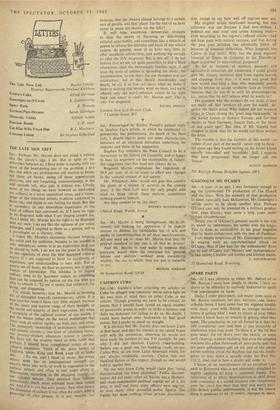SIR,—Mr. Gatsby's letter criticising my articles on Cuba for alleged
`one-sidedness' throw more light on his own state of mind than on either Cuba or my articles. Though granting my facts to be correct, he insists that I should have found an equal number of favourable points in order to strike a balance and dubs me dishonest for failing to do so. No doubt, I could have leaned over backwards to find good points, but I prefer to stand up straight. It is obvious that Mr. Gatsby does not know Cuba at first hand, and that his interest in the island began only with the revolution, otherwise he would not have made the howlers he has. For example, he asks why I did not mention Castro's road-building. Batista was a great one for building roads, so was Carlos Prfo, so are most Latin American rulers, for not always creditable reasons. Castro has not matched Batista in this respect, though no one would hold it against him.
No one who knew Cuba would claim that 'racial discrimination has been abolished.' Public discrimi- nation did not exist—after all Batista was a Mulatto, and made considerable political capital out of it, his chief of staff and many army officers were negroes, so were many other powerful public figures. The regime has done nothing about private discrimina-
lion, except to say how well off negroes now are.
My original article mentioned housing, but this reference was cut because I had over-written. I pointed out that rural and urban housing built-- even according to the regime's inflated claims—had not kept pace with natural increase, and that during the past year building has admittedly fallen off because of financial difficulties. What hospitals has Castro in fact built? Why has the giant regional hospital at Topes de Colantes in the Escambray been converted to non-medical purposes?
As far as incomes of workers, peasants and agricultural labourers are concerned, I could gladly give Mr. Gatsby statistical data from regime sources and clippings from Hoy, if it were any good. But how would that help a man who repeatedly asserts that he refuses to accept verifiable facts as 'credible' because they do not fit in with his preconceptions, i.e., insists that he will believe what he wants to?
His question why the workers do not strike if they are badly off, like 'workers all over the world,' de- serves the Stalin prize. Why indeed did not workers strike in China during the 'great leap backwards,' in the Soviet Union or Eastern Europe, and for that matter in Nazi Germany, Fascist Italy, or the Spain of ten years ago'? But then, if Mr. Gatsby had stopped to think that far he would not have written the letter.
The trouble is that the Gatsbys of this world—or rather of our part of the world—never stop to think: ten years ago they found writing on the Soviet Union equally 'one-sided' and 'incredible.' Still, I suppose they ,
ycisfhave progressed; they no longer call one f ALFRED SHERMAN






































 Previous page
Previous page